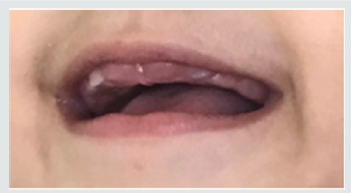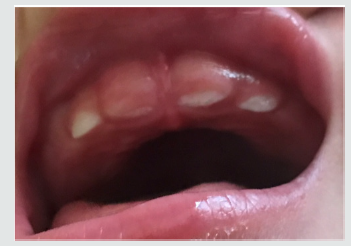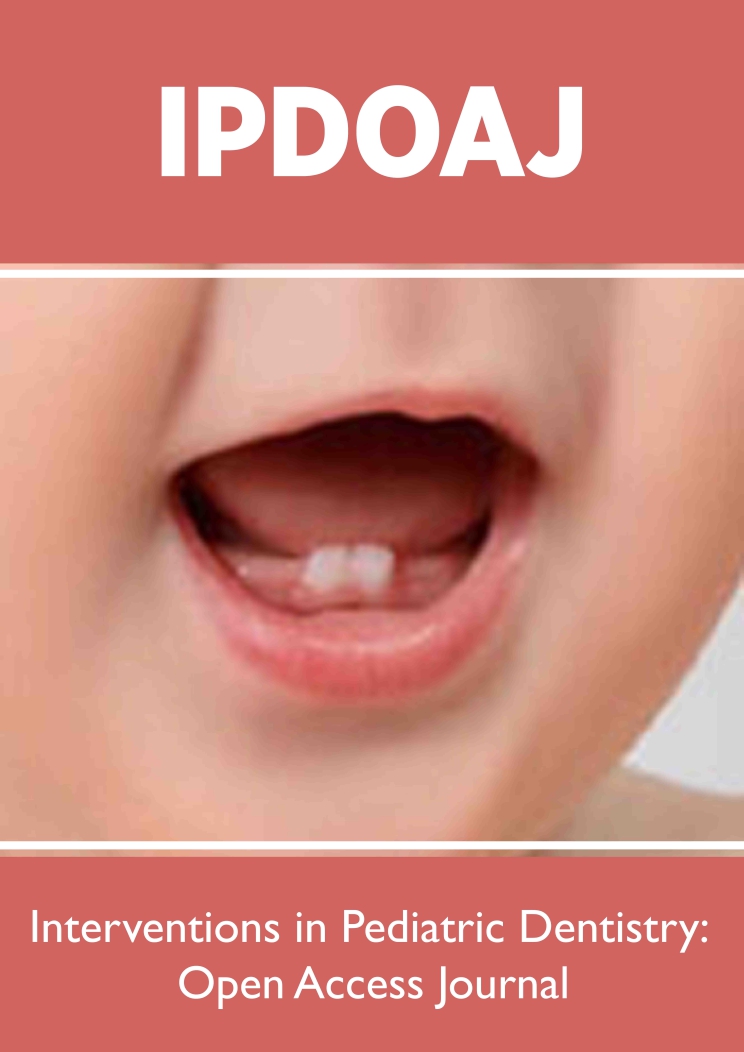
Lupine Publishers Group
Lupine Publishers
Menu
ISSN: 2637-6636
Case Report(ISSN: 2637-6636) 
Vampire Teeth: An Unusual Eruption Sequence of Deciduous Teeth Volume 2 - Issue 3
Siham Said Abdullah Al Shereiqi1, Triveni Mohan Nalawade2* and Rachappa MM2
- 1Junior Dental Officer, Oman Dental College, Muscat, Oman
- 2Senior Lecturer, Oman Dental College, Muscat, Oman
Received:January 21, 2019 Published: January 30, 2019
*Corresponding author: Triveni Mohan Nalawade, Senior Lecturer, Oman Dental College, Muscat, Oman
DOI: 10.32474/IPDOAJ.2019.02.000139
Abstract
The aim of this article is to highlight an uncommon eruption sequence of deciduous maxillary central incisors, create awareness and its early management if indicated. There might be underlying systemic cause and a prompt visit to a dentist might help in arriving on a proper diagnosis, and thus improve prognosis.
Introduction
One of the most eagerly awaited moment by parents in their child’s life is the eruption of the first deciduous tooth. Teething is one of the major and important milestones a baby has to attain. That is a reason why parents get anxious if there is a delayed or even a slight difference in the sequence of eruption. General sequence of eruption of deciduous teeth is central incisors, lateral incisors, first molars, canines and lastly second molars. Usually mandibular teeth erupt before maxillary teeth. Eruption of deciduous teeth begins at around 6 months and is completed by 30 months most of the times [1]. Variations in the sequence of eruption can be seen in some cases but eruption of maxillary laterals prior to maxillary centrals is quite uncommon. It is important for the parents to know that there is a variation in the sequence of erupting and when is it essential to contact a specialist.
Case Report
An eleven-month-old girl who is also my niece had a very uncommon appearance when her first deciduous teeth erupted. She actually looked like a Vampire with only maxillary deciduous canines having erupted before maxillary deciduous central and lateral incisors. I felt it was uncommon and at the same time was worried what was the reason for this occurrence. Were the maxillary deciduous central and lateral incisors congenitally missing or just delayed in eruption? Next day at our work place, a teaching institute, with the photographs of my niece, I consulted two of pediatric dentists for opinion. To my surprise, even they had not seen such a case in their 13 years of exclusive pediatric dentistry practice. On having a closer look at the pictures, both Pediatric dentists noticed that her maxillary deciduous lateral incisors had erupted before the central incisors and not maxillary canines as I had thought before. She had maxillary lateral incisors in 11 month and two weeks. Note the presence of eruption bulges in the maxillary central incisor area ruling out the possibility of my niece having congenitally missing teeth (Figure 1). After two weeks her mandibular deciduous central incisors erupted (Figure 2). At least my worst fears were proven wrong, but I was curious whether this eruption sequence is common? On a detailed literature we found no published article related to this unusual eruption sequence. As we did not come across any published article from our literature search; we did a brief review from online sources (a mother’s online group in UK Baby Centre birth club groups). This article reports a case and an online review of a few unusual eruption sequence cases which have not been published in literature before. These cases were collected in the period of 2009 to 2015. We came across a total of 33 cases of which 15 were girls and 18 were boys.
Figure 1: Intra-oral photograph showing deciduous maxillary lateral incisors erupted at 11 month and two weeks. .

Figure 2: Intra-oral photograph showing deciduous mandibular central incisors erupted after two weeks.

Results
Table 1: Showing the respective calendar year of such cases being reported by mothers in the online forum and the gender of the children who have had this unusual eruption pattern.

Table 1 showing the respective year of such cases being reported by mothers in the online forum and the gender of the children who have had this occurrence. It was observed that males had a slight predilection in this unusual eruption order of Deciduous Maxillary laterals erupting before centrals. This unusual sequence of eruption was observed in the maxillary arch only. A few interesting correlations were found. One mother reported that the father of the baby girl also had similar Vampire teeth. Another pair of siblings both being sisters too had similar Vampire teeth! Also, few of the mothers immediately posted the eruption of maxillary centrals in a short span of time. So, we can conclude that there was no case with congenitally missing deciduous maxillary centrals reported (Table 1).
Discussion
Most of children have a normal pattern of eruption sequence with a slight delay of 6 months being considered normal. Deciduous first molars erupt prior to deciduous canines in both maxillary and mandibular arches and is considered the common eruption sequence [2]. But in some cases, there is a notable variation in erupting sequence as in above cases which might cause parental anxiety. All teeth observed to have delayed eruption were deciduous maxillary central incisors. This might have been due to heavily keratinized mucosa covering the deciduous maxillary centrals and the presence of a deeply attached labial frenum. This might delay the deciduous maxillary centrals cutting through the thick mucosa and thus erupt after the deciduous lateral incisors [3]. Due to two cases reported by mothers in family members i.e. father-daughter and another instance of sisters there seems to be genetic predisposition [4]. As it was seen, only 33 cases were found in online mother’s group in a period of six years. The lower number of such reported cases in the literature might be due to subsequent eruption of centrals as in the reported case of my niece. Even elders in the family must be giving timely advice that this being normal occurrence and nothing to worry about. So most of parents are not visiting a pediatric specialist and hence no reported case in available published literature! Some of deciduous teeth eruption does not follow a correct chronological sequence, due to multiple reasons such as trauma, genetic traits, thickness of mucosa over central incisor region as it requires more time to cut and erupt thorough. All these factors contribute to alterations in the normal eruption sequence of the teeth [5]. In other cases, a delay in eruption of teeth can be a symptom of underlying health issues. Prematurely born and low birth weight babies can get their teeth late and may also have enamel defects. Some genetic conditions, such as amelogenesis imperfecta and regional odontodysplasia, can cause delay in tooth eruption and be poorly formed. Delayed tooth eruption can also be a symptom of malnutrition and a deficiency in vitamins or minerals, especially calcium and vitamin D. It could also be associated with Down’s syndrome or a hypothyroidism. Other symptoms of hypothyroidism, such as weakness, fatigue, headaches, and joint stiffness may cause baby to experience delays in walking, talking and may be overweight [6]. So, an accurate analysis of local causes like eruption cysts [7], supernumerary teeth etc and systemic factors causing delay in eruption should be done by a dentist.
Conclusion
This case report will also bring to the notice of novice dentists that this is a normal variation in most of the cases and not something to advice unnecessary investigations and add to the parent’s anxiety rather than relieve it. If otherwise, a prompt visit to a dentist might help in arriving on a proper early diagnosis, and thus improve prognosis of any associated systemic health condition as goes the English proverb goes, “A stitch in time saves nine”!
References
- Logan WHG, Kronfeld R (1933) Development of the human jaws and surrounding structures from birth to the age of fifteen years. J Am Dent Assoc 20(3): 379-427.
- Verma N, Bansal A, Tyagi P, Jain A, Tiwari U, et al. (2017) Eruption Chronology in Children: A Cross-sectional Study. Int J Clin Pediatr Dent 10(3): 278-282.
- Triveni Mohan N, Rachappa MM (2018) Eruption Disorders in Deciduous Dentition: a Pediatric Dentist’s Perspective. BAOJ Dentistry 4: 49.
- Sylvia A Frazier Bowers, Chaitanya P Puranik, Michael C Mahaney (2010) The etiology of eruption disorders - further evidence of a ‘genetic paradigm’. Semin Orthod 16(3): 180-185.
- Chawla HS (1986) Early infancy teeth. J Indian Soc Pedod Prev Dent 4(1): 48-51.
- Suri L, Gagari E, Vastardis H (2004) Delayed tooth eruption: pathogenesis, diagnosis, and treatment. A literature reviews. Am J Orthod Dentofacial Orthop 126(4): 432-445.
- Nagaveni NB, Umashankara KV, Radhika NB, Maj Satisha TS (2011) Eruption cyst: A literature review and four case reports. Indian J Dent Res 22(1): 148-151.
Editorial Manager:
Email:
pediatricdentistry@lupinepublishers.com

Top Editors
-

Mark E Smith
Bio chemistry
University of Texas Medical Branch, USA -

Lawrence A Presley
Department of Criminal Justice
Liberty University, USA -

Thomas W Miller
Department of Psychiatry
University of Kentucky, USA -

Gjumrakch Aliev
Department of Medicine
Gally International Biomedical Research & Consulting LLC, USA -

Christopher Bryant
Department of Urbanisation and Agricultural
Montreal university, USA -

Robert William Frare
Oral & Maxillofacial Pathology
New York University, USA -

Rudolph Modesto Navari
Gastroenterology and Hepatology
University of Alabama, UK -

Andrew Hague
Department of Medicine
Universities of Bradford, UK -

George Gregory Buttigieg
Maltese College of Obstetrics and Gynaecology, Europe -

Chen-Hsiung Yeh
Oncology
Circulogene Theranostics, England -
.png)
Emilio Bucio-Carrillo
Radiation Chemistry
National University of Mexico, USA -
.jpg)
Casey J Grenier
Analytical Chemistry
Wentworth Institute of Technology, USA -
Hany Atalah
Minimally Invasive Surgery
Mercer University school of Medicine, USA -

Abu-Hussein Muhamad
Pediatric Dentistry
University of Athens , Greece

The annual scholar awards from Lupine Publishers honor a selected number Read More...







